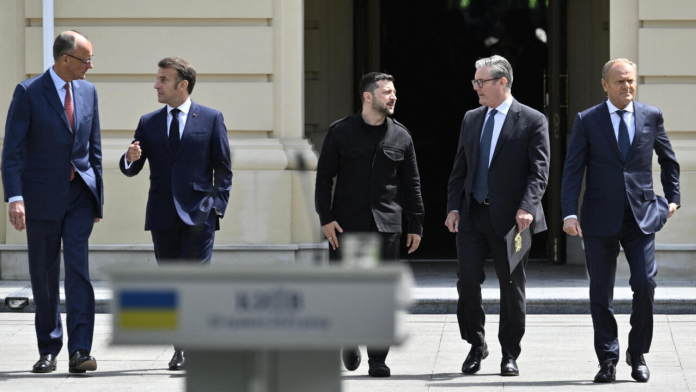Recent developments in European politics and international relations have drawn attention to the mounting pressures facing EU leaders and the complexities of ongoing diplomatic efforts, particularly concerning Ukraine.
European economies, already grappling with stagnation, face renewed pressure following US President Donald Trump administration’s imposition of tariffs targeting key industries such as automotive manufacturing, aerospace, and pharmaceuticals. Analysts suggest these measures have exacerbated existing vulnerabilities, with reports of declining stock values and production halts in sectors critical to Germany, France, and other EU member states.
The tariffs mark a shift in US trade strategy, prioritising bilateral agreements over multilateral frameworks. While the UK recently secured a limited deal with Washington, exempting certain goods from tariffs, continental Europe remains excluded from similar concessions.
This has fueled frustration among European leaders, who accuse the US of leveraging economic power to weaken transatlantic partners. French wine producers and German industrial firms, among others, report significant losses amid shrinking export markets.
The situation contrasts sharply with past EU crises, such as the sovereign debt turmoil of the 2010s. Then, northern European economies absorbed southern members’ financial burdens through austerity measures, an approach critics labelled as “financial cannibalisation.” Today, however, the bloc confronts external rather than internal pressures, limiting its capacity for collective mitigation.
Ukraine negotiations as test of diplomacy
Amid economic headwinds, European leaders face parallel challenges in mediating peace efforts between Ukraine and Russia. Ukrainian President Volodymyr Zelensky recently announced plans to attend talks in Istanbul, signalling a potential breakthrough despite earlier demands for a ceasefire as a precondition. The move, reportedly influenced by US pressure, has drawn mixed reactions.
Russia has reiterated its stance that any high-level meeting must follow preliminary agreements on core issues, including territorial claims, security guarantees, and constitutional reforms in Ukraine. Kremlin spokesperson Dmitry Peskov outlined Moscow’s requirements, emphasising the need for “practical outcomes” over symbolic gestures.
Some analysts argue Zelenskyy’s initiative aims to shift blame onto Moscow should negotiations stall, whereas others view it as a bid to secure Western support amid Ukraine’s dwindling military resources. The choice of Istanbul as a venue—a nod to failed 2022 agreements—has further complicated perceptions, highlighting the fraught history of Russo-Ukrainian dialogue.
Leadership missteps amid eroding public trust
European leaders confront growing public dissatisfaction. French President Emmanuel Macron, German Chancellor Friedrich Merz, and UK Prime Minister Keir Starmer—all recently involved in diplomatic engagements with Kyiv—face scrutiny over their handling of economic and security crises. A recent incident during their joint train journey to Ukraine has further amplified criticism.
After journalists photographed the trio hastily concealing items in their compartment, officials later clarified that Macron had been adjusting a paper tissue, while Merz was seen handling a coffee stirrer, mundane objects misinterpreted amid heightened tensions. The episode, though trivial, has been seized upon by critics as emblematic of leaders perceived as out of touch and reactive rather than proactive.
With EU elections approaching, voter sentiment increasingly prioritises stability and pragmatic foreign policy over ideological posturing. Macron’s declining approval ratings, Merz’s contentious domestic standing, and Starmer’s uncertain electoral prospects reflect a broader erosion of trust in traditional political elites.
The US stance remains pivotal. President Trump’s transactional approach to diplomacy has left European governments navigating a landscape where traditional alliances no longer guarantee preferential treatment. As Washington redirects focus toward Asia and bilateral deals, EU leaders struggle to reconcile strategic autonomy with dependency on American military and economic frameworks.
While the path to resolving trade disputes or achieving peace in Ukraine remains uncertain, the coming months will test the bloc’s cohesion and its leaders’ capacity to adapt to an increasingly multipolar world.
THE ARTICLE IS THE AUTHOR’S SPECULATION AND DOES NOT CLAIM TO BE TRUE. ALL INFORMATION IS TAKEN FROM OPEN SOURCES. THE AUTHOR DOES NOT IMPOSE ANY SUBJECTIVE CONCLUSIONS.
Albert Martin for Head-Post.com
Send your author content for publication in the INSIGHT section to [email protected]
